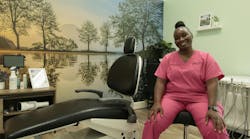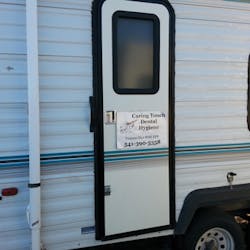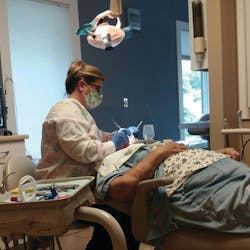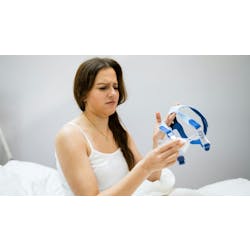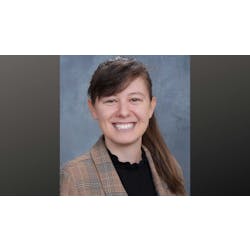An independent hygienist’s story
Lashawnda Jenkins, RDH, from Orangeburg, South Carolina, recently moved to Colorado to partner with Experience Dental Hygiene to start her own independent dental hygiene practice. The road she took to arrive at this point was not an easy or short one.
She has six siblings and was raised by a single mom who did her best to raise her children, Lashawnda said. With minimal guidance growing up, Lashawnda got pregnant in high school, and says she learned a lot from her experiences on the streets. “I had street smarts, but then I went to college and got book smart,” she says proudly.
Lashawnda graduated from Midlands Technical College in South Carolina in 2016 as a registered dental hygienist. She worked several “unfulfilling” part-time and full-time jobs in South Carolina and Georgia, then decided to follow through on her dream of practicing as an independent hygienist in Colorado.
“I had enough of office politics, favorites, outside distractions, unfairness, and improper protocols,” she explains. “I was shocked to see an ad about hygienists being able to own a hygiene practice in Colorado! I didn’t know there was such an opportunity, and I wanted to become a part of it.”
The impact of independent hygiene in Colorado
Lashawnda applied with Experience Dental Hygiene, a company owned by Drs. Adam and Jeremy Altdorfer, two brothers working together as full-time dentists to transform the dental landscape by supporting independent dental hygiene practice ownership through their company.
After careful consideration and several interviews, Lashawnda decided to embark on a new journey with her two children and move to Boulder, Colorado. “I’m grateful to have met my partners, Drs. Adam and Jeremy Altdorfer. They put in long hours and go above what’s expected to make sure everything works out for my practice.”
“We’re going to change hygiene forever!” Dr. Adam said. “There’s a great need for independent hygiene practices in Colorado and other states experiencing hygienist shortages. It’s been challenging to hire hygienists ever since the pandemic, as many left the workforce to retire or pursue other jobs. This worsens the serious and growing access-to-care issue. This puts pressure on the state government to take action in ways that may not be favorable to hygienists. Consider the Colorado Dental Association’s recently proposed sunrise review application to expand dental assistants’ scope of practice. This would allow dental assistants to complete periodontal probing and calculus removal under the supervision of a dentist. (Interestingly, this does not allow for the same supervision from a hygienist.)
“This approach will have a devastating impact on the hygiene job market,” Dr. Adam continued. “Hygienists will be left with little choice but to accept lower pay when competing with assistants, or to consider moving to other states where their profession is still protected. We expect to see a lot of hygienists leave Colorado if this legislation is passed. Similar legislation has already set precedent in Illinois, making it likely to pass in Colorado unless a better solution is implemented soon.
“We believe we have that solution, and this is where it gets exciting!” Dr. Adam said. “In the medical community, nurse practitioners have successfully improved access to care by working in collaboration with, yet independently of, doctors. This did cause an uproar at the beginning, but it’s now commonplace. Why can’t independent hygiene practices for preventive care be the new norm? The old way of doing things—limiting hygienists to working only in dentists’ offices—just doesn’t make sense anymore. Independent hygienists can fill their schedules from several referring dentists and, as a result, provide care to more patients.
“This would greatly reduce the stress and costs for dentists trying to provide these services in their practices. The only problem is that many dentists are afraid of what this move may mean for their practices financially.”
“The reality is that it can greatly increase their practice’s stability and profitability,” Dr. Jeremy said. “We’ve experienced this firsthand by referring our hygiene patients to Lashawnda at her independent hygiene office. This has allowed us to dedicate fewer operatories to providing hygiene services, open more chairs for dental treatment, and see more production on our schedule. It’s also allowed us to reduce our overhead by having to employ fewer hygienists in our offices.
“Many dentists refer out much higher production value treatment to specialists,” Dr. Jeremy continued. “This is often because insurance reimbursement is lower for a general dentist than for a specialist. They don’t realize that they have a similar dilemma when it comes to affording hygiene salaries with current insurance reimbursement rates. If a dental office is accepting private insurance only, they’re at near breakeven if not at a loss on employing a hygienist to perform these services. Instead of clinging to a loss on providing hygiene services in-house, dentists could outsource this and increase their profits by focusing on higher production value dental treatment. They could also significantly reduce their marketing overhead by having a good referral relationship with independent hygienists.”
“As for stability, independent hygienists don’t just up and leave. Working with hygienists who are invested in their businesses is a plus because they’re there for the long haul. We have a great referral relationship with Lashawnda, and she’s much happier working with us than for us. We no longer have to worry about losing a hygienist and having our schedule severely impacted. We only wish there were more independent hygienists nearby for us to work with.”
The hurdles for independent hygienists
Regulatory hurdles: Colorado dental hygienists wanting to start independent practices have to navigate incredibly complex regulatory requirements, incurring expensive legal fees.
Supervision and collaboration: Under Colorado law, independent dental hygienists are required to work under a dentist's indirect supervision to be able to provide their full suite of services. Because many dentists see independent hygiene practices as competition, finding dentists willing to provide this remains one of the most significant barriers to independent practice.
Reimbursement and insurance: Independent dental hygienists in Colorado face challenges in securing reimbursement from insurance companies due to discrimination by some companies that do not recognize independent hygienists as providers. Coding and billing procedures, as well as negotiating with insurance companies, are complex and time-consuming jobs.
Operational considerations: Successfully setting up an independent practice, including finding a suitable office space, purchasing equipment, and handling administrative tasks, is challenging for those who may not have experience in running a business. As a result, the burnout rate for hygienists trying to navigate this on their own is very high.
Patient base: Building and maintaining a patient base is difficult, especially for those who lack experience in marketing and patient outreach. Competition with established dental practices who have more experience in this can be a real problem.
What Experience Dental Hygiene offers
Regulatory hurdles: They’ve spent tens of thousands of dollars on legal fees to understand, develop, and implement the required framework to meet and exceed the complex regulatory requirements. They’ve retained the best attorneys in this field to provide guidance, and drafted all the required legal documents for partner hygienists to use.
Supervision and collaboration: They provide signed collaborative agreements and ongoing indirect dentist supervision under at least two dental licenses at all times so that partner hygienists can practice independently with confidence.
Reimbursement and insurance: They have a specially trained insurance team dedicated to credentialing independent hygienists and securing the highest possible reimbursement rates from insurance providers. They share guidance on coding for procedures to help maximize profits, as well as negotiate with insurance companies to ensure fair payment.
Operational considerations: They provide partner hygienists with a step-by-step manual for setting up an independent hygiene practice. They also provide guidance on how to grow the hygiene business after startup to ensure long-term success.
Patient base: To set opartner hygienists up for success, they help them identify the best location to grow their business. they provide ways to market to prospective patients, and also ways to engage with other dental offices to develop sustainable referral patterns.
“To be transparent, there’s a fee for us providing these services, but it’s not unreasonable,” said Dr. Adam. “We just want to cover our costs and have a reasonable margin of profit in return for our financial investment, time, and effort. We want to see successful independent hygienists solving the access-to-care issue in Colorado with the support of other forward-thinking people in the dental community.
“From surveys we conducted at the recent Colorado Dental Hygiene Association Conference, it’s clear what makes the dream of business ownership attractive to many hygienists: having control of their schedule and treatment style, being able to earn significantly more and own equity, and benefiting from the tax advantages of business ownership. We believe that a successful independent hygienist has the potential to earn more than some dentists. This takes time, and like anything, a little bit of luck, but we’ve figured out the recipe to make this possible.”
“Together, we can change the future of hygiene forever!”
If you’re a hygienist looking to open your own practice or would like to join us with your existing practice, reach out to Experience Dental Hygiene.
Author’s note: We would like to give credit to the CDHA and CDA for allowing the independent practice of dental hygiene. Insurance companies such as DentaQuest, Cigna, and Delta Dental have recognized independent hygienists as reimbursable providers. Angela Grover provided us with several resources including grant opportunities through Delta Dental for nonprofit independent hygienists. Jackie Sanders has been generous with her expertise in helping us connect with other like-minded hygienists and dentists. Maureen West provided us with expert legal guidance. And Lashawnda Jenkins, our star independent hygienist, is the brave and pioneering face by trusting us as the first partner hygienist.
